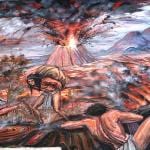I awake early this morning to sunshine and billowing curtains, the sweet smell of summer filling the bedroom. Stumbling out of bed, I look out the window to witness corn shimmering greenly in the breeze, and daylilies nodding their heads in assent. I can’t wait to get outside with a cup of tea, to drink in all that beauty.
As the mother of an adult son with autism, with all of the heaviness that can be wrapped up in that role, I’ve found a way to tap into the joy constantly simmering under the surface of the daily difficulties: Searching for God in the beauty of the day-to-day. Meeting God in the garden. Making time for God with a cup of tea as the wind makes everything new. It’s on days like this that I feel born again as yesterday’s burdens, frustrations, fears and cares of living with disability are bleached in sunshine and carried away on the breeze. I’ve tried to pass that discovery of God in all things beautiful onto all of my sons, including Joel, who has autism.
Joel doesn’t have a lot of language. He can make his needs known, but feeling words are not a big part of his vocabulary. But words aren’t necessary when we chase rainbows in the car; when we drive to the nearby lake for our weekly heron hunt; as we sit in our pontoon boat, looking up in awe as an eagle flies overhead.
I don’t always “know” what Joel’s thinking, but I can sense it, simply by the look on his face. A look of wonder; a face-transforming smile of joy; a quick glance at me that says, “Hey, Mom, this is amazing!”
Like Joel, when I was a little girl I didn’t know the big theological words like “immanence” and “transcendence.” I just knew that something bigger than myself rose in my chest when I witnessed something of great beauty. Later, I would be able to name that something as God. A God who is visible in all of creation. A God in whom all things were created, and in whom all things hold together. God is definitely in Joel’s vocabulary, as are the words Holy Spirit and Jesus. Joel may not be able to have a theological discussion with me or his dad, but on the way to church every Sunday he says, “It’s time to worship God! I love Jesus! I love to worship!”
The following childhood memory belongs to me, but I would be willing to bet my life on the fact that Joel has felt the same rising in his chest at the sight of a full moon rising. So, Joel, this story is for you, bud. And I would ask you, the reader, to pull up a childhood memory of awe and delight; a time when you “knew” God was near; and find ways to pass that “knowing” on to your child, no matter his or her cognitive capacity. Heron hunts work, as does chasing rainbows in the car!

We watch the moon rise, Mommy and me. She saw it coming, and rushed in the house to get me, running, hurrying me by the hand up Benton Avenue for a better view. It hangs at the end of the street, a giant peach in the night sky, bigger than a house—bigger than two houses!
The man in the moon looks down on me, and I stare back at him. I reach out my hand to touch him, to pluck him from the sky, thinking maybe I can take him home to play.
And as the moon rises, there is a rising in my chest, a pink peach of a moon rising inside of me, so big, so round, I can’t contain it. It rises and rises at the end of the street and in my chest until my chest hurts—I can’t swallow—I’m sure I will burst like the peaches Mommy plunks in boiling water to remove their skins, the pulp underneath juicy and sweet for my favorite peach pie.
How can the moon hang in the sky, my five-year-old self wonders, yet be stuck in my throat, as if I swallowed it whole? A mystery. A puzzle. A theologian’s delight.
That giant peach of a moon, God’s gift and my mother’s greatest gift to me, is hidden yet inside of me. It rises when sunset paints the sky, when a heron rises up, great wings beating, when a baby giggles. It starts, this rising, with a pressure in the chest, a lump in the throat, followed by an explosion of joy; hot, sweet peaches bursting their skins.
Question to ponder: In what ways are you teaching your child to search for God in the beauty of the day-to-day?












